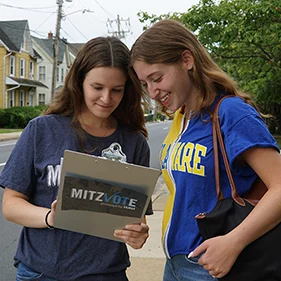‘Voting is loving thy neighbor’

Even in a normal election cycle, college students consistently face barriers when navigating the voting process, including confusion over registration and where to vote. Amid the pandemic, many of these problems are exacerbated, leaving students utterly muddled about mail-in and absentee ballots and how to ensure their voices are heard come election day.
Hillel International’s MitzVote initiative is designed to help students maneuver the complexities around voting by breaking the process down into simple steps, from registration to ballot submission, and giving students resources about civic action and education. This year, MitzVote is using the MotiVote platform, where teams of students and alumni can track their completion of voting-related actions and compete to earn prizes, such as Apple Airpods, gift cards and voting-themed tote bags.
The voting rate at U.S. colleges and universities more than doubled during the 2018 midterm election, jumping from 19% in 2014 to 40% in 2018, according to a study from the Institute of Democracy and Higher Education at Tufts University. Student voters, who have historically been known to sit out elections, are increasingly becoming a major constituency demanding change.
So far, over 130 Hillels serving 170 campuses have signed up to participate in MitzVote, including Hillel at The George Washington University. Students and staff at GW Hillel have been using regular Instagram stories to increase the number of students on their seven MitzVote teams, like “Why I Vote Wednesdays,” where they feature a different student each week explaining why voting matters to them as citizens and as Jews.
Lizzie Irwin, 20, who serves as GW Hillel’s MitzVote liaison, said involving underrepresented micro-communities on campus is one of her main goals with the initiative.
“Historically, Jewish people have lived in places that didn’t allow us to partake in local, regional and national governance,” said Irwin, a junior studying political communications and geography. “Now that we have that opportunity, we need to seize it. We hold a special privilege that’s not universal and we need to be civically engaged for the sake of those people that don’t have the opportunity to be.”
At University of Miami Hillel, the MitzVote initiative has inspired Rachel Salstein, the campus’ IACT coordinator, to expand the civic education resources provided by her Hillel.
Salstein has been working with Hillel@Home and the Florida region of the Anti-Defamation League to organize a minority voting rights information session on Oct. 5. She’s also planning three Zoom discussions about hot-button issues on students’ minds, including civil rights, climate change and a “Ballot 101” session where students can learn about the candidates and referendum questions on this year’s ballot.
For Salstein, civic engagement is a communal duty.
“Voting is loving thy neighbor,” Salstein said. “If you care about your community, getting to know what’s important to it should be important to you as an individual. You chose this campus community for a reason, and you should be committed to bettering it.”
Some Hillels, including the University of Wisconsin Hillel Foundation, will serve as polling places for their communities. Before election day, UW Hillel will also text thousands of students about voting and transform their building into a voter registration center.
For Hillel professionals and student leaders across the country, voting is a Jewish, as well as a civic, responsibility.
Adina Smirin, a Springboard Innovation Fellow at Central Florida Hillel, sees getting students involved in civic action as an investment in both the larger community and her individual students.
“Education leads to personal growth and development because students gain a deeper understanding of the issues they’re learning to care about,” Smirin said. “By starting to learn as young adults, they’ll carry that understanding with them throughout their lives.”
At Elon University Hillel, which has a team ranked 11th on the MotiVote platform, MitzVote student ambassador Gabe Scherzer, 22, wants to make sure that students pair ideas with action.
“In the modern age of social media, it’s very easy to fall into the trap of thinking you’re doing enough simply by sharing a post or commenting your opinion,” Scherzer said. “I’d like students to understand that they can make a difference at a higher level and have their message reach ears outside of their social bubbles.”
At University of California, Berkeley Hillel, Executive Director Rabbi Adam Naftalin-Kelman has agreed to learn and perform a TikTok dance if their MitzVote team registers 400 student voters. They’ve already contacted 110 students about voter registration.
To curb the coronavirus pandemic, UC Berkeley is denying students access to using campus printers this semester. For Berkeley students, MotiVote’s option to print and mail absentee ballot applications has proved especially useful.
For Katie Lyon, a 20-year-old MitzVote intern at Berkeley Hillel, using the Mitzvote platform has made her feel more informed about the voting process and more empowered to share that information with others.
“Tikkun olam is one of the most important elements of Judaism for me, and I believe that the world cannot be repaired without listening to the voices of young voters,” said Lyon, who studies political economy and conservation/resource studies. “Helping others through the process of voting, while getting more informed myself, feels like an expression of my Jewish identity.”
Dionna Dash is part of the inaugural Hillel International Writers Program, a five-month opportunity for Jewish undergraduate students interested in journalism.